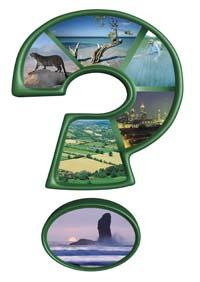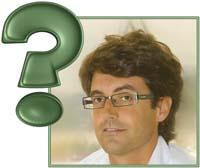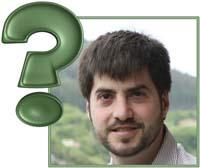What do we want to save?
01/06/2009 | Roa Zubia, Guillermo | Elhuyar Zientzia Komunikazioa

(Photo: Guillermo Roa)
Humans can hardly stop climate change, but they can try to minimize the impact of human activity. For this it is a very popular recipe. The greenhouse effect is causing Earth warming, so it is logical to reduce greenhouse gas emissions.
This can be accompanied by many other measures. Not all are so well known and it is unclear whether many of the proposed measures are effective or not to address climate change. In any case, large advertising is channeled to encourage those believed to be contrary to climate change.
The fight against climate change is a symbol of environmental movements and not just them. It has now become a politically direct reality. As far as possible, many companies have internalized it to advertise their products; governments have included it in the programs; and political parties, whether or not they are in government; many non-governmental organizations also collaborate in actions against climate change.
It seems, at least, an effort of the whole society. In fact, many groups have joined with very different approaches with the same objective.
This context allows one to wonder what is behind this general idea. Is it true that all climate change groups have the same objective? From a general standpoint, perhaps yes, everyone expects us to "save the planet" through these efforts. But perhaps, starting to materialize, it is not so clear what the final objective of the struggle is.
We have asked some scientists who have participated in the issue What does human beings want to save with the fight against climate change? Planet? The biosphere? The man? Society? The quality of life of what we call the first world? These are the answers.
Related information
Director of the BC3 (Basque Centre for Climate Change / Klima Aldaketa Ikergai)

(Photo: Photo gallery)
The problem is for everyone, for man yes, but also for other species, some of them are losing at a worrying speed. We want to avoid the loss of life, premature deaths and violent decay of life standards.
Jon Saenz
PhD in Physics from the University of the Basque Country
Earth as a planet we cannot save it because there is nothing to save. The Earth will disappear from here to several years, yes or yes. But if you look at the number of people living on the planet 100 years ago and how much they live today, you will see that our choice of life is getting narrower, because there are more and more people.

(Photo: Oihane Lakar)
As we are so many people in this world, the migrations that occurred 10,000 years ago cannot occur. So, I think, on the one hand, we have to save the society we know (maybe it's not the best society possible, but it can really be worse). And if the weather changes, I am convinced that it can get worse: we will live more or less the same, in Norway we may live better, but all models say that in Africa they will live much worse...
This can be a political or social debate, but there is no doubt that many inhabitants of the world will live much worse if the climate changes. Then, if you ask me what is worse, that or better distribute the resources we have, we move on to another topic. Today many people are starving and the reason is that we do not properly distribute resources. But that is another debate.
Then there may be a conservation debate. Do we have to keep the beeches of Euskal Herria? I think that would be a secondary debate, and I would say yes. Then, if the temperature, precipitation, etc. change, the beeches may disappear and, along with the beech, the entire habitat of the beech trees.
Patxi Gre or
Environmental economist and partner of NAIDER

(Photo: Naider)
My opinion is that we want to save everything: our species, the planet and biodiversity. I explain it to you.
If we don't fight climate change, the Earth's average temperature could rise to five degrees Celsius by the end of this century. This will make climate change the main route of pressure on biodiversity, which will aggravate a situation of extreme gravity. Decreased water, decreased food production, aggravated health problems and the proliferation of violent weather events (droughts, heat, hurricanes, floods, etc. ). This will affect the lives of millions of people, especially in economically underdeveloped countries. These are also the ones that have contributed the least in the origin of the problem.
Kepa Solaun
Director of Factor CO 2
The idea of saving the planet is, of course, an abstraction. But within this we must differentiate three interests: those of our species, those of other animal species and the integrity of the planet or life. The combination of these three groups of interest gives rise to ethical concepts about our species and its relationship with the environment (anthropogenic, animalistic, Earth ethics, etc. ).

(Photo: Factor CO2)
Starting with the simplest, it is clear that climate change will not affect the planet itself and life in general (remember the Gaia hypothesis). Most of the announced impacts have to do with human health, artificial infrastructure and natural resources that have economic value for us, such as biodiversity. However, following the effect on the environment are the interests of other species, in which the impact will be negative.
The important thing is that all interests have the same direction, regardless of their size. From a point of view of human solidarity (within a generation or between several generations), while taking into account other species, climate change is worse than climate stability.
Rachelle Hollander
Philosopher and Director of the Center for Engineering, Ethics, and Society

(Photo: Rachelle Hollander)
When we are considering climate change as a problem, we are asking how much we have to slow the speed of change so that many species and environmental resources can adapt. The problem is that we can do many things to protect the most exposed. And what we do would also be beneficial to curb the speed of climate change.
Roxana Boidi
Doctor of Physics, currently working in the meteorological administration of Bucharest
I think it's a problem of our species. We have to leave the way open to human evolution. The planet has suffered and will suffer climatic changes, whether or not caused by humans. There are many natural factors involved in these climate changes: Life cycle and activity of the Sun, geological processes such as continental drift, Milancovich cycles in Earth orbit parameters, volcanic activity, as well as internal climate changes.

(Photo: Recent searches
Today, man competes with a centuries-old or millennial geology. We are producing very rapid changes compared to the time scale of natural climate change. Man has burned for two hundred and fifty years fossil fuels produced by nature for hundreds of millions of years. We are out of scale. Earth has its own rhythm.
We must face it in the time that our destiny has touched us. We want to save ourselves, including our ancestors and our descendants; we want to save ourselves from the anticipated destruction of human culture.
Roa Bridge, Guillermo
Services
254
2009
Security
029
Climatology
Dossier
Library


















